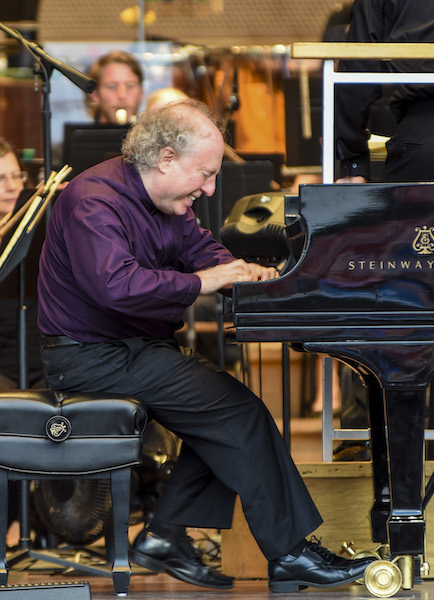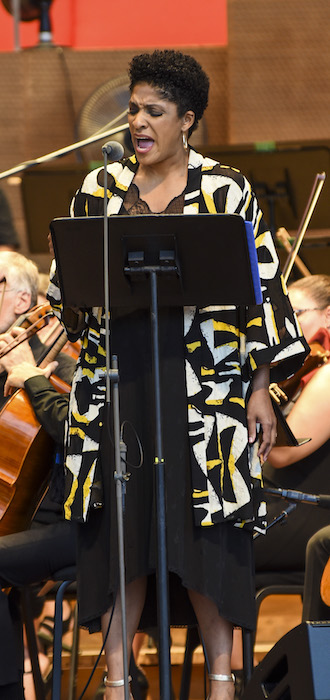Gershwin concerto takes flight while Kahane oratorio stays earthbound at Grant Park Music Festival

This weekend’s Grant Park Music Festival program is offbeat even by the venturesome standard of the lakefront summer series: a father-and-son team featured separately in a Gershwin concerto and an hour-long oratorio on the plight of homelessness. That the results from pianist Jeffrey Kahane and singer-composer Gabriel Kahane were wildly mixed was perhaps inevitable.
The Concerto in F is the only full-length concertante work George Gershwin completed in his short lifetime. While his inimitable Rhapsody in Blue is a mini-concerto of sorts, Gershwin’s Concerto in F is the real thing— a three-movement, half-hour work for piano and orchestra.
Gershwin was planning a second piano concerto—to be premiered at Ravinia—and had just started discussions with Jascha Heifetz for a violin concerto at the time of his death. Along with Porgy and Bess, Gershwin’s sole concerto makes one feel acutely the tragic loss to American music by the composer’s death from a brain hemorrhage at age 38.
From the arresting timpani attack of the opening bars, the singular confidence with which Gershwin tackles the genre is striking and distinctive. The composer fluently melds his jazz-tinged melodies and populist style within the traditional tripartite structure with remarkable panache and audacity.
Inexplicably neglected for decades, Gershwin’s concerto seems to be finally coming in from the shadows in recent years. One hopes that the Concerto in F will assume its place among the most played of American concertos, alongside Samuel Barber’s Violin Concerto (another work that took decades to become a repertory staple).
Certainly the fiery, bravura performance delivered by pianist Jeffrey Kahane Friday night at the Pritzker Pavilion provided the kind of idiomatic advocacy that should ensure the future of this terrific homegrown work.
Kahane was fully in synch with Gershwin’s deceptively elusive style from his first entrance, teasing out the jazz phrases. He brought full power to the galvanic virtuosity of the first movement as well as the aggressive, driving bravura of the finale.
Yet the pianist also relaxed nicely into the bluesy interludes. Kahane underlined the languid introspection of the Adagio, with principal trumpet David Gordon’s solos fully evoking the music’s urban nocturnal essence.
All of Gordon’s colleagues in the Grant Park Orchestra were in similar top form and Carlos Kalmar’s vital, full-blooded direction put across the energy, individuality, and quirkiness of Gershwin’s score, with especially thrilling exhilaration in the final bars.
The second half of the evening’s family affair featured the Chicago premiere of emergency shelter intake form by Gabriel Kahane, the pianist’s son.
Throughout its 85 seasons, the Grant Park Music Festival has done its part for contemporary music. Most local commissions and premieres tend to stay in the eight-to-ten-minute range, so one must give credit to Kalmar and colleagues for programming an ambitious 52-minute contemporary work by a little-known composer.
Kahane declined to provide a program note for this local premiere, stating that his libretto speaks for itself in a work that examines “the scourge of deep poverty in America through the lens of homelessness and housing insecurity.”
Though calling for four vocal soloists and ambitiously labeled an “oratorio,” emergency shelter intake form is more a setting of 13 songs by Kahane, whose background is that of a singer-songwriter more than a concert composer for orchestra.

In fact, Kahane’s vocal music is varied, tonal and attractive, albeit often scored with somewhat rudimentary skills. His music is most effective when closest to his pop origins, as with “Certainly we can all agree,” sung by the sweet-voiced Holcombe Waller.
The problem with emergency shelter intake form is the composer’s own bloated and ponderous libretto. His principal conceit is to contrast the words of bureaucratic forms and indifference to the affecting plight of the homeless and the humanity of those dealing with its effects.
Anyone who lives or works in downtown Chicago encounters the homeless issue on a daily basis, and indeed most are harmless individuals and many sympathetic. Yet there are also those who are aggressive and even dangerous as any perusal of daily headlines shows. The official city policy under the previous mayoral regime of closing facilities and deinstitutionalization appears to have done little for the homeless while making the streets less safe for the average citizen.
The issue is a complex and seemingly intractable one. But there is little complexity or nuance in Kahane’s simplistic broad-brush approach, which essentially recycles the usual hoary suspects, blaming the homeless issue on America, capitalism, Goldman Sachs, Milton Friedman, racism, sexism, and, in an ad-libbed remark by Holcombe, the Millennium Park audience itself.
Kahane appears to fancy himself a satirist with the songs’ ironic recitation of form questions, and song titles like “A brief history of the subprime mortgage loan crisis.” But nothing was actually funny in his verbose, polemical settings and there was little laughter, even from Chicago’s uber-blue audience. Kahane’s lyrics exude all the human warmth, wit and charm of a harangue by Elizabeth Warren.
Ultimately, the smarmy moral superiority and colossal virtue-signaling in Kahane’s work is off-putting to his own message, the composer condemning pretty much everyone who is less “woke” than he believes himself to be.
Kalmar, Grant Park’s artistic director and principal conductor, clearly believes in this work, having commissioned and performed it with his Oregon Symphony last year. He and the orchestra gave it as much solid advocacy as possible, though the ultimate experience was hardly “transformative,” as the conductor hoped.
Alicia Hall Moran, the most prominent of the four soloists, displayed a flexible mezzo and contributed strong and sensitive vocalism, often making more out of the texts than was there. One would like to hear her in more grateful music.
The other three singers—Holland Andrews, Waller and Kahane, function as more of an ironical Greek Chorus though Waller and Kahane brought engaging voices and clear diction to their solo moments.
The non-professionals of the “Harmony, Hope & Healing Chorus”—presumably including some homeless people— brought a game, genuine quality to their brief, symbolic appearance in the final song that made up for the lack of polish and cohesion.
The program will be repeated 7:30 p.m. Saturday at the Pritzker Pavilion. gpmf.org
Posted in Performances





Posted Jul 06, 2019 at 1:15 pm by Roger Conner
Your review and that of Howard Reich (Chicago Tribune) reflect the 180-degree opposite evaluations that existed between my wife and me. We both were blown away by the piano concerto, but differed on the Kahane piece. She liked it “because it was poetical”; I found it just “interesting” because, although I have been active in refugee issues and integration with her for over half a century, I found the musical scoring disappointingly thin.
Posted Jul 06, 2019 at 3:17 pm by Bobbie R.
I attended Friday’s performance. Gabriel Kahane’s insightful work tackles much more than the plight of the homeless on city streets. As Maestro Kalmar mentioned in his introductory remarks, “emergency shelter intake form” explores the realities of poverty and income inequality at many levels. The libretto addresses the systemic causes of homelessness, which may include low wage employment, discrimination, domestic chaos, and medical problems. As he notes in Section VII, even an orchestral violinist or oboist can be unemployed, so maybe the reviewer is not aware of the current economic status of symphony musicians in Baltimore, who recently lost their anticipated summer income, and face an uncertain future as BSO musicians. And yes, Mr. Johnson, the reckless behavior of financial institutions like Goldman and Lehman Bros. during the subprime loan crisis did, in fact, inflict extreme stress and misery on the most economically vulnerable populations.
Fortunately, many classical music organizations and opera companies are taking steps to address topics of injustice, immigration, and racism (including the Opera Theater of St. Louis, Glimmerglass Opera, and the Lyric Opera of Chicago). Classical music audiences are often seen as elitist and out of touch, and this review perpetuates that attitude. Affordable housing remains unattainable for middle- and low-income groups, while the top 1% benefits from up to $750,000 of mortgage interest deductions. For those who didn’t know that, Kahane tells us in Section XI. His libretto is cleverly infused with sarcasm, humor, and irony. The assessment of “moral superiority” in describing Kahane’s work is unjustified, as is the cynical analogy of a humorless “harangue” by Elizabeth Warren. CCR readers are familiar with attacks on Senator Warren from disreputable sources. We certainly don’t need humorless jokes about her on this intelligent forum.
Posted Jul 07, 2019 at 8:29 am by Brandon
Gershwin was reported to die from a malignant brain tumor (glioma, GBM), I don’t see any reports that it hemorrhaged.
Posted Jul 07, 2019 at 11:26 am by Lawrence A. Johnson
While Gershwin’s brain tumor clearly was the contributing factor, the specific cause of death is now generally acknowledged as a Duret hemorrhage following emergency surgery for the tumor. That appears to have been indicated by the fact that when Gershwin stood up (with assistance) he immediately collapsed and went into a coma, dying that same day. There are many articles in medical journals but this footnoted letter in The Lancet gives the details concisely.
Posted Jul 14, 2019 at 10:52 am by Odradek
“many classical music organizations and opera companies are taking steps to address topics of injustice, immigration, and racism”
Which would be a good way to lose their audience. Who really wants to be scolded and harangued by a composer for not having the correct attitude to something?
I appreciate that Kalmar likes to take chances on things – he does a great job with mainstream-modernist 20th century music, and less often performed composers generally. But the review makes this piece sound like a complete waste of time.